slow living Archives – Hippie in Disguise
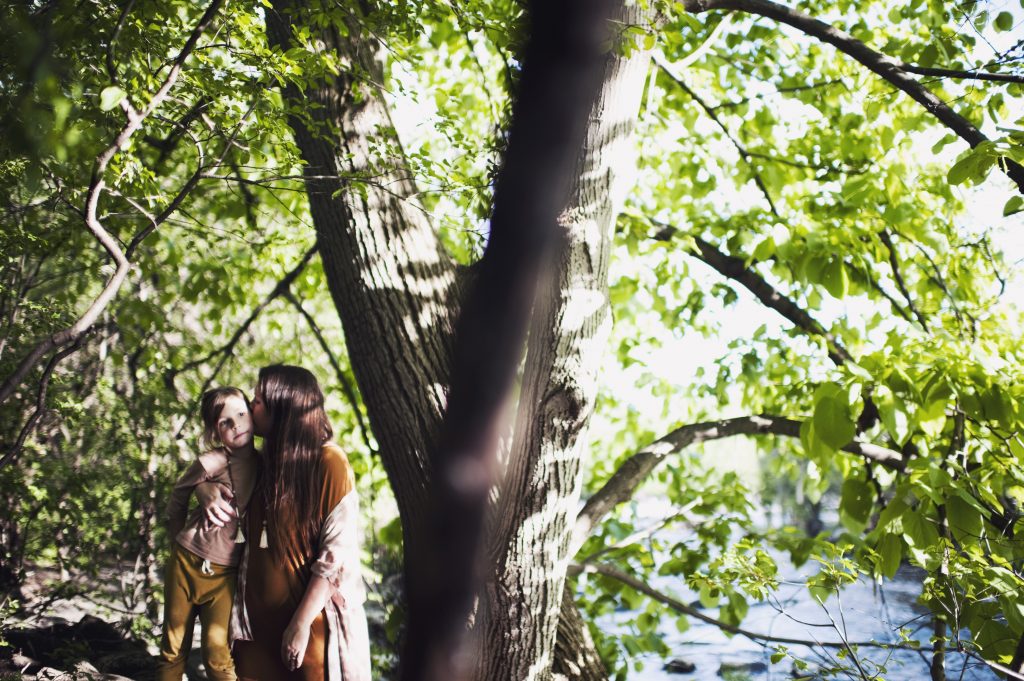
I always prefer to talk about others than talk about myself. However, I get a lot of questions about how we live, so I thought I’d share this interview we did where I talk about how we try to live a slow, minimal family life, in a fast, big city.
The interview below appears in the Rwanda issue (2016) of the Global Guardian Project learning capsules, an interactive STEM-based curriculum and magazine aiming to educate children and families about global environmental issues, animals, ecosystems, and much more. Each issue includes an interview with a family striving to live a sustainable lifestyle. I encourage you to explore their magazines and educational materials, which are beautiful and inspiring, and includes all sorts of activities, art downloads, and other fun projects.
Rebecca Lane, founder of the Global Guardian Project, interviewed me about our family’s way of life in August 2016.
Tell us a little about your family. Where do you live + how do you spend a typical day with your family?
Hello! We are Matt, Ro, Sen and Danielle, a family of four living in Ottawa, the capital city of Canada. Ottawa has four very distinct seasons, experiencing very hot and humid summer days (40 Celsius / 104 Fahrenheit) and very cold snow-filled winter days (-40 Celsius / -40 Fahrenheit). We feel fortunate to live in a place with such variety in weather and we do our best to make the most of it, by spending lots of time outdoors in the elements year round. As a car-free family, we live downtown to facilitate our travels by bike or foot.
About us? First, there’s me, Danielle, I do a lot of things. I work outside the home as a Policy Strategist for the Canadian government, where my main task is advising the government on social and economic problems related to supporting vulnerable populations. I don’t define myself through my occupation though. It’s my passions that make me who I am. Foremost I am a mother. But I’m also a creative, a writer, a minimalist, and slow living advocate. Matt, does similar work outside the home, although he advises on ocean health and climate change. Matt is an avid athlete and an ambassador for cycling lifestyle. Ro and Sen are our two children. Ro is our 11 year old girl. She is highly intuitive, deeply loving, naturally funny and the definition of a social butterfly. She loves the arts and is always dancing, singing or drawing. Sen is our 5 year old boy. He is a wild one and highly self-directed. He is head strong, while also being very sweet and calm. He loves inventing, climbing, dancing, cycling, and pretending to be a ninja.
Our children attend public school and we work outside the home, so our family doesn’t get much time together during the week. We’d love to change that, but instead we make the most of our weekend time together and make a concerted effort to slow things down and connect. We generally schedule nothing for weekends so that serendipity can lead the way.
Our typical weekend day involves walking around the city. There’s a lot of thinking behind why I value walking, wandering, and urban adventuring, and part of that thinking is to show my children that there is an abundance of nature in the city. But, if we only ever walked down Main Street or drove to get to the places we visit they would think, as many others do, that our city is a concrete jungle. I also want them to learn that it’s fun to have no plan, that schedules can get in the way of opportunity. So, we usually leave our home, with water bottles and snacks, and have no specific destination in mind, just a broad sense of direction. Along the way it’s a little thrill to find a pocket of wildflowers, painted alleyways, new bakeries, and pop-up art shows. Our favourite days usually involve time by the beautiful Ottawa River and eating all our meals outdoors.
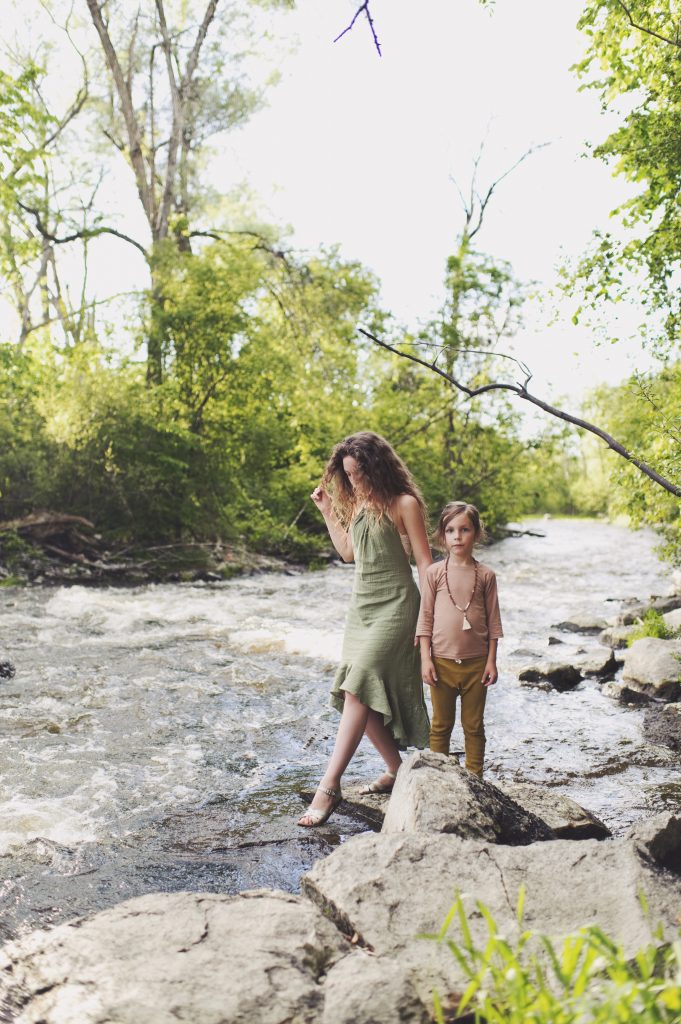
It’s obvious that slow + minimalism are core beliefs for your family. Tell us a little about what that means.
Minimalism and slow living are growing in popularity, which means there is a range of ways people interpret and apply these concepts. What people refer to as minimalism varies quite a lot. For example, minimalism is used to refer to a home aesthetic or a visual signature. For me, minimalism is a way of life, it’s a lens through which we approach our days, our activities, our thoughts, our behaviours. This lens focuses on reducing quantity and increasing quality. Our minimalist lifestyle is motivated by environmental concerns and my affinity with simplicity, this is why I like to call it ‘ecominimalism’.
Minimalism and slow living intersect easily for us. Slow living is really about connecting more with the things we do and the people in our life. Connecting with the present, mindfully, wholeheartedly. To do this, to live slowly, we must do less. To increase our quality of connections, we must decrease the quantity of things we do.
Tell us a little about your family life before your shift.
I have a natural affinity for slow and minimalist living. That being said, our family did go through a few years of living on fast-forward. And while our weeks still include a list of commitments, I approach them with mindful presence, which makes the experience completely different.
Like I mentioned above, I work in government policy. The nature of my work is unpredictable and generally hectic. After working in this environment for a few years I started to notice that I carried this hustled, stressed energy home with me. I would manically clean and tidy all evening, I would speedily move from task to task. On the weekends, I would hustle around doing errands, take the children to a list of activities, catch up on my social calendar, and generally try to pack as much “life” as I could. I had one setting and it was fast-forward.
Finally it hit me one day that I never slowed down. That, ironically, while I did so much I never felt like I accomplished anything. Worst of all, I desperately missed my children, despite spending every second of the weekends with them. I realized that something had to change. I was never going to catch up. Going fast wasn’t working, so I decided to go slow.
At the time I hadn’t heard of slow living or minimalism. But I knew intuitively what our family needed. We needed quality time together, we needed to do less, so that the things we did we could do in a more meaningful way, with presence, and without a need to rush through them to get to the next thing on our itinerary or to do list. We needed to take things slowly, to be able savour the moment, savour the weekend, savour our lives. So, that’s what we started doing. As you can imagine, we’ve never looked back.
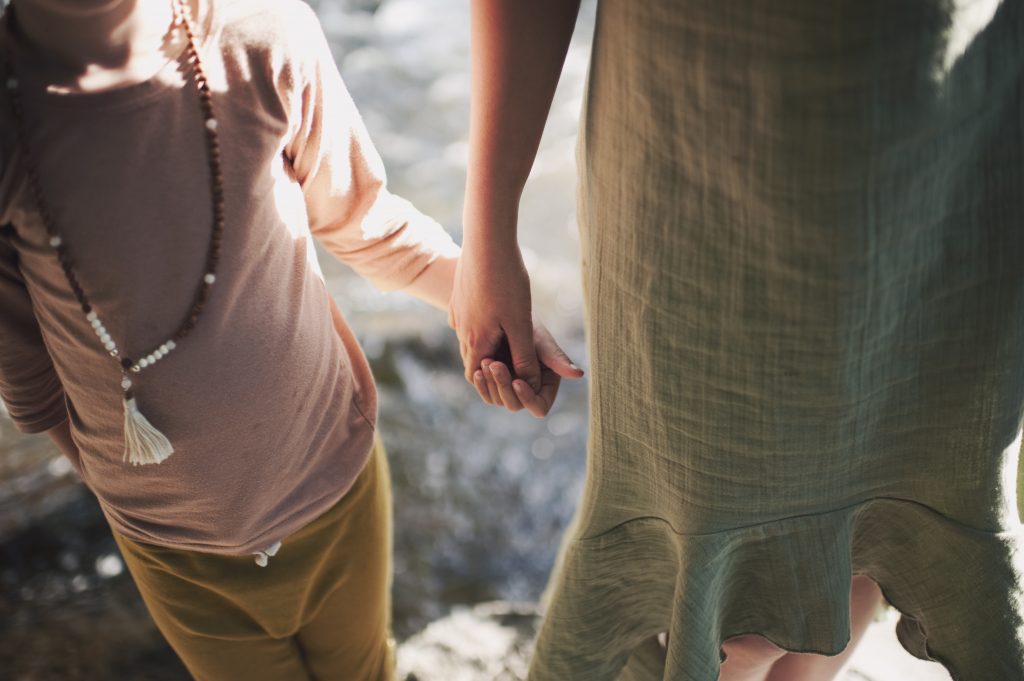
How has the shift to a minimalist life affected your family dynamic?
Approaching life from a minimalist perspective has been immensely satisfying for us. The children can enjoy life at an organic pace and I feel more present with them when I’m not concerned about when our next activity starts. Moreover, it’s great that my children have learned that they can be thoroughly engaged in life, full of energy and curiosity, while doing something simple, outdoors, uncurated and free. I call this minimalist fun. Slow days out in nature.
We no longer accept every social invitation or birthday party. The children only do one extra-curricular activity a week. I worried a bit that they would miss things or feel left out, but in all honesty they haven’t shown concern once about a lack of activity. The benefits of doing less, feeling calm and having a sense of freedom with time, have won over any sense of lack.
In terms of minimalism with things themselves, we’ve never had a bank account full of money, so the children are accustomed to not getting much in the way of stuff. That being said, we now only get them gifts for birthday and Christmas, and it’s one special thing, whereas before they would sometimes get new toys and books throughout the year. They adapted to this fairly painlessly because they were offered fun alternatives, like play time with friends and outdoor adventures.
Overall, our family dynamic has improved. We all feel a little calmer, more connected, and enjoy being around each other. As a hungry athlete, Matt might not *love* that I take a minimalist approach to meals and don’t observe as much of a schedule around meal times, but he’s adapting!
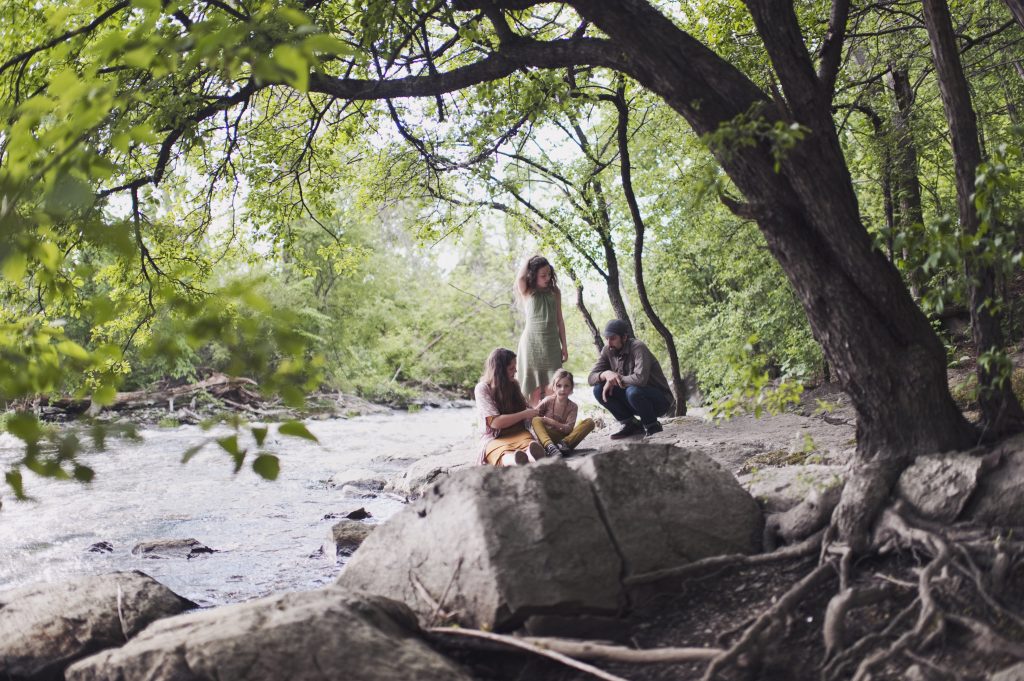
What are some ways you see your children being positively affected by the shift?
I think that in spending time in nature and living a slow, minimalist life, I am preserving my children’s innate, natural born strengths: creativity, curiosity, connection. I don’t think my children were struggling much from our fast-paced life, but I know that in time they would have shown symptoms of fatigue, so I’m glad I made a change before we started seeing social or behavioural issues. Overall, the children have more time and freedom to just be themselves and not ply to an adult’s will or schedule. I think the typical traits of a child: creativity, wonder and positivity, need to be protected and cultivated, particularly as these traits will be critical in solving the massive global issues emerging today. By letting children be themselves I believe I am preserving these traits in them.
In terms of positive effects, our children certainly notice that we live differently than virtually everyone we know. They ask a lot of questions about why we “can’t go places fast in a car?” or “have a big piles of presents?” or “buy something packaged in plastic?” or “go to two parties on the weekend?” But these questions always lead to great conversations about choice and aligning what we care about (values) with what we do (behaviour). Children have an innately strong sense of right and wrong and so talking about what we care about, for example healthy oceans, and how our behaviours are linked to these, makes it easy to opt-out of single use plastic. The positive effect is that the children are learning a lot about how everything is connected. We are not islands. We are embedded. Living like that everyday, they are understanding from an early age, and developing the necessary habits, they need to make sustainable choices, for the health of the planet, but also sustainable choices about how they use their time and energy, for their own mental health.
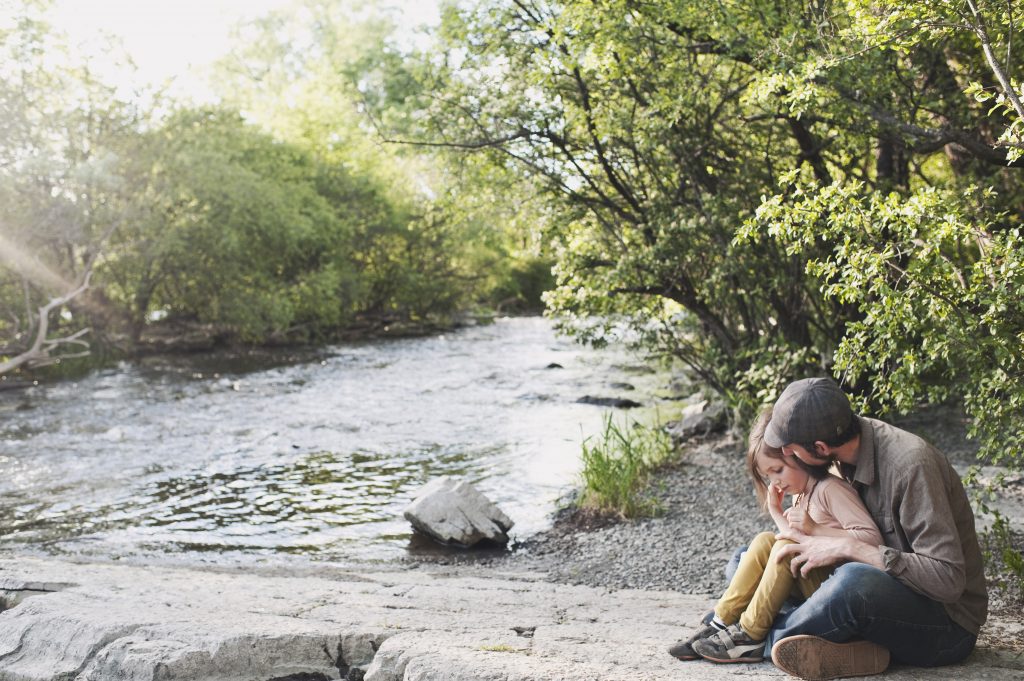
What are your hopes for your children by allowing them to be more connected through nature.
The benefits of time in nature are many and there are many great thinkers writing about this. Creativity, independence, mental and physical health, are just a few of the direct benefits. For me, I focus on time in and connecting with nature, for those reasons, but also to instill an understanding of impermanence and our embededness in nature. I also think that if my children have their fondest, happiest memories out in the wild, then they will be motivated to protect it.
Understanding impermanence cultivates a sense of appreciation and presence. Knowing that each path we walk will never be the same twice, we learn to make the most of each experience, we savour the temporary nature of a field of wildflowers, the leaves on the trees. Through experiences like these I hope to keep alive that sense of living in the moment that children are born with. Our innate mindfulness. Our innate presence.
Understanding embededness is key too. Spending time in nature, in the wild, we learn about the abundance of life outside our own. We, more intimately, understand our connection – our embededness – to the systems of life on this planet. We are part of nature. Nature is not out there. We are nature. While I don’t think we should be self-motivated to protect wildlife, if understanding our own precarity through connection is what motivates an interest in conservation and protection, then that’s a good thing. The more children (and we adults) have life experiences with living plants and animals, the more we can empathize with them, the more we feel a part of their world, and us a part of theirs. Our interconnectedness becomes embodied.
Perhaps most importantly, spending most of our time in a natural setting, we are keeping our impact on the planet light, developing a deeper connection to it, and fostering a sense of protection and compassion for the earth and its inhabitants. All this while making memories and strengthening our family bonds.
What would one piece of advice be to families who want to make the shift to a slow, minimalist lifestyle?
Just start. Make one change a day. And go slowly! There is no sense in rushing toward slow, minimal living.
***
Update, November 2018: In re-reading this interview, I can see that we have evolved and changed somewhat from this way of life. Matt has been totally won over by minimalist meals and now thrives on this approach! We aren’t perfect about avoiding single use plastic, still. And our children do sometimes get gifts, like a new toy or book, on occasions other than Christmas and birthdays. I guess that’s a reflection of our financial situation, we can actually afford these things now. But, we continue to be very limited in the amount of new things our children bring into their life and us into our home.















![Toni Kroos là ai? [ sự thật về tiểu sử đầy đủ Toni Kroos ]](https://evbn.org/wp-content/uploads/New-Project-6635-1671934592.jpg)


